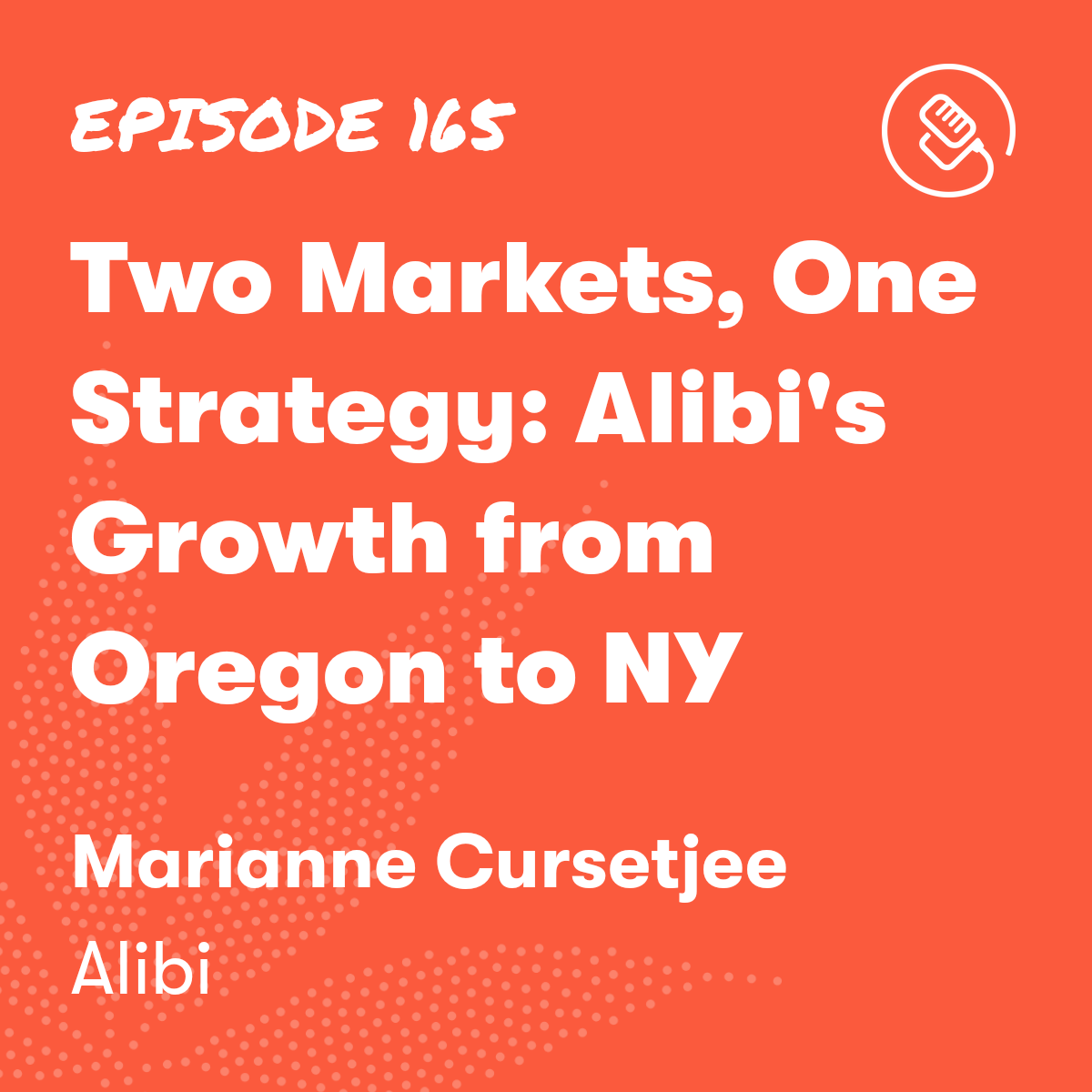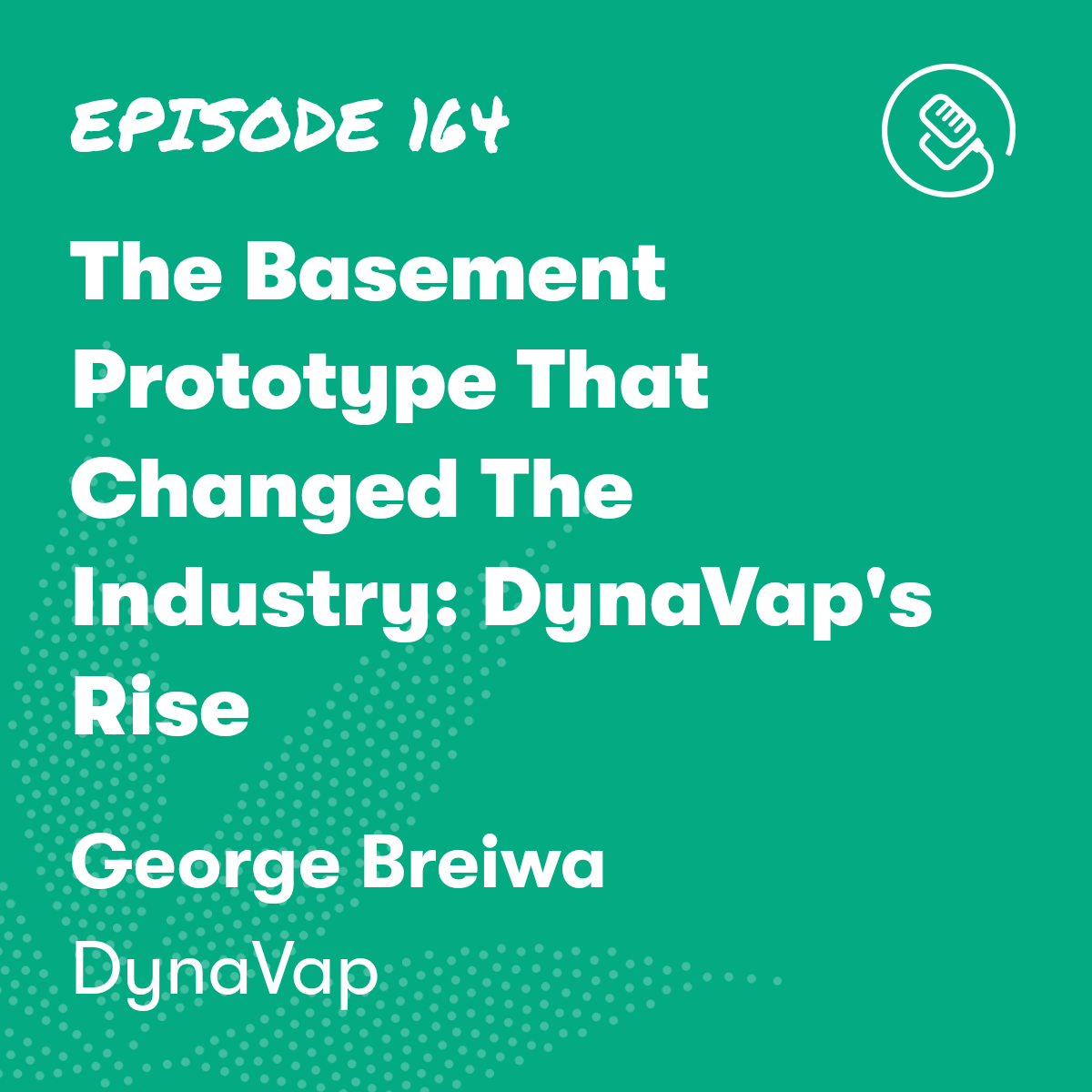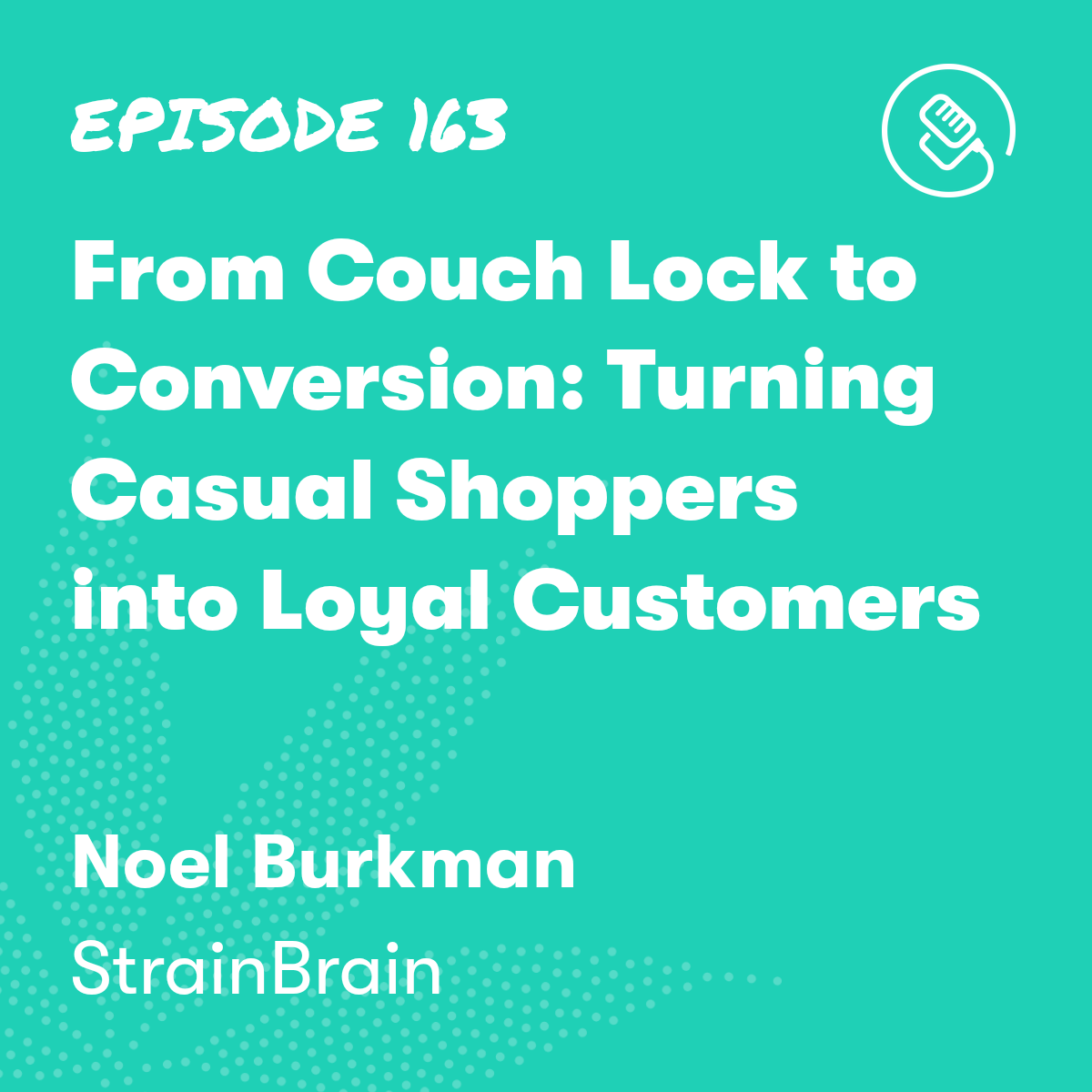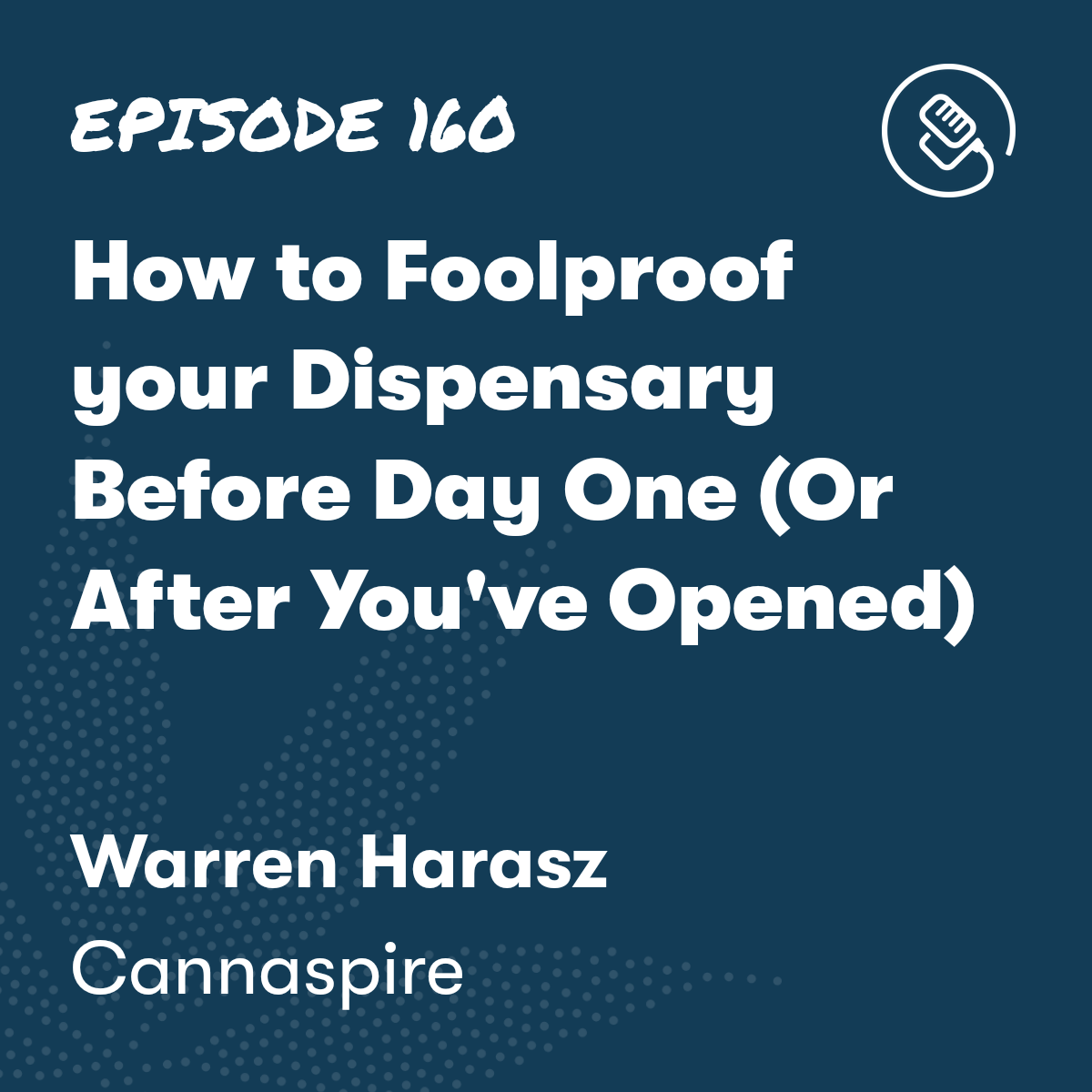

This Security Expert Has Opened 40+ Dispensaries.
Episode Description

Episode Transcript
Tommy Truong: [00:00:00] Haley thank you so much for joining me today.
Haley Glover: Oh, thank you for having me.
Tommy Truong: So we have a very exciting topic today, security,
Haley Glover: exciting for me at least, you know.
Tommy Truong: security Systems with I get questions all the time on security systems and, uh. What is needed? How does, so I'm so happy that you're here to clear the air on a lot of questions that our listeners have.
Haley Glover: I'm happy to, you know, we've, um, we've been in this, the cannabis industry for 13 years and so we definitely have some good stories and great experience on, on how to help clients prevent some of the, the negative or not so fun aspects of it. And, uh, hopefully be able to successfully get open.
Tommy Truong: So if I am a, a dispensary owner and I just got license. Just got approved. When should I start thinking about security in relation to the build out?
Haley Glover: I would say you're a little too late. No, um, security, you know, it's, it's one of the first things I think you need to think of. Well, it kind of goes along [00:01:00] with when you're selecting your location, is it something that. Is going to require a ton of security. And, and when I say that, I mean, does it have a ton of little rooms or is it going to be kind of a rectangle?
You're gonna put some walls up pretty straightforward. You know, most retail you have, you know, maybe your reception. Um, you have your retail floor secured storage, an officer two, a break room restroom. That's pretty straightforward. But the more small rooms awkward. Curves and turns that you have, it's gonna make it a little bit more expensive, a little more challenging.
So kind of something to keep in mind, um, but right when you're in that selection of, okay, I found a location, now I need to start looking at budgeting and selecting vendors. And that's everything from your architect, general contractor, you know, security vendor, it, um, ev everything that really would be going on during the build out process.
Tommy Truong: [00:02:00] How, how does one per, how do dispensary owners. that what they're building out is compliant to the regs.
Haley Glover: That's where we come in. It's, it can be a challenge. And there have been a lot of floor plans that I've received from clients that said, Hey, I wanna be open in two months. I look at the floor plan and I'm like, well, you're missing your secured storage. So I. If you're not going to pass or if it's something where, um, you know, there are a lot of states that say you have to verify that the person is over 21 years of age before they're allowed to see any cannabis, cannabis products.
And that could even include signage. So what does that mean? Does that mean that you have to have somebody outside the front door, or does that mean somebody standing at the front door right when you walk inside? Or does that mean it has to be its own room? So that's where we come in. Um, a lot of the times we try to get clarification from regulators so that we can very clearly understand what they, what they write.
Sometimes it's not super clear. Uh, [00:03:00] but that's again, where we come in and we try to do the homework and so that once we do get those questions, we're able to answer 'em for clients and say. Hey, we, we already have clarification. This is what their expectations are. This is what you have to follow in order to be compliant.
Tommy Truong: And then you were mentioning, uh, issues with Minnesota today, right?
Haley Glover: Minnesota has been a challenge. There's a, there's two regulations that they're just not very clear. Um, you know, one has to do with the alarm system and a backup alarm system. The other one has to do with the access control and the wording of it. Um, but, you know, there's a lot of states, I, I can't remember which state it was, but there was one that said.
You have to keep 90 days of tapes. Now I'm in my thirties, but I don't, I don't think that we use tapes anymore for recording video. So, um, you know, some of 'em are a little outdated. I, I don't really know where they pulled 'em from, but, uh, yeah, so there's a lot of clarification needed in, I'd say most states.
Tommy Truong: So what happens then if I'm a dispensary, I'm [00:04:00] opening up in man, uh, in Minnesota Do does, do things just halt.
Haley Glover: No, they don't halt. You know, there's, there's things that we can do. Um, lots of communication that I have between, uh, the regulators. Uh, there's some lobbyists that we'll we'll reach out to, but we can still continue to move forward. Uh, so what I usually do is I'll say, this is our best case scenario.
Here's our worst case scenario, and here's what to expect if that worst case scenario happens. So there's no. There's nothing that's blind about it. You know, it's that full communication and understanding of what that looks like. And, um, you know, we also, we'll tell regulators, well, we might not have implemented this because you weren't very clear, but here's what we did do.
Um, so it's kind of like Massachusetts. You know, they said that you had to have a back of alarm system, um, aside from your primary alarm system that was installed by a secondary company. But an alternative is you could have a generator, which. I think people should have generators anyways, because even beyond security, you've gotta keep a lot of product at a certain temperature and humidity.
[00:05:00] So, you know, just thinking about the overall operation, you know, I, I don't think that they have the, I don't think you can get away with the knuckle busters that they used to have. You know, whenever you lose the power and you still have to pay somebody out.
Tommy Truong: Oh, that's, that's interesting. I actually never really, really thought of about that, that backup generators, you would probably reduce your insurance costs too.
Haley Glover: I would hope so. Um, but you know, a lot of insurance companies, if you have that communication, um, say I'm going above and beyond what the state's requiring or my local municipality, and they normally will, we'll work with you on that and give you some sort of deal.
Tommy Truong: You probably get this a lot, uh, probably every, every single engagement. Why is this so expensive in the cannabis industry
Haley Glover: Well, it, that's a challenging question. Um, a lot of clients that, let's just say they own a business in a different industry, let's, you know, just say a boutique clothing store, they have [00:06:00] security. So it might be a basic alarm system. Some cameras. Maybe one over the cash register, but that's really about it.
Uh, they probably don't have anything in the break room and sometimes not even on the outside of their building, there's no regulation or requirement for them to have anything. Their insurance might be pleased with them adding cameras and being proactive about their security, but there's no state regulatory body that comes in and says, this isn't sufficient.
So when it comes to cannabis. It's very high risk. There's a lot of desirable product cash, and so these regulations, they can, they can make it pretty expensive. You know, New York, they have an eight hour backup battery requirement. That's, that's a lot of money. That's thousands of dollars just for the battery, so that's not even including your alarm, your access control, or your video surveillance.
Tommy Truong: You know, a, aside from making sure that the minimum regulations are abide by, how should [00:07:00] a a dispensary owner think about where to spend their money? I. In a security system.
Haley Glover: So there's a, there's a couple of ways that I go about this typically. Um, so if I'm designing a client support plan, I'll put, okay, here's what's required and here's what's recommended and why. And most of the time they say, well, let's go with what's recommended. And then if we need to cut some costs, we know where we can.
But other than that, you know, it's the longevity of the equipment. How long will it last you? How long is your lease going to be? Or if you own the building, how long do you plan on staying open there? And if it's not a good warranty, then you're, you should probably have some concerns about, am I going to have to replace equipment in three years?
And if you do, then you have to either. Halt your business, the operations, or you have to have, um, that technician escorted the entire time that they're there. And most of the time they won't come after hours or you're paying a lot more for that. [00:08:00] Um, usually quite a bit more, uh, to have it after, uh, operational hours.
But then again, still you would have to have an employee, somebody with management that's there escorting them through that process. Um, so the quality of equipment and, you know. Really when you're selecting the security vendor is finding a partner, somebody that you trust. And if you think about it, your security systems, there's a lot of vulnerability there.
So if you select a company because they were the cheapest one, and they could get in and out and one day, well, when you call them two years later, do they pick up the phone and do they say, sure, I'll be there within a day or less. Maybe not because they're quickly installing and moving on to the next project.
So it's really somebody that you feel comfortable with and that can really get there in a timely manner. Um, because let's just say if you have a camera that goes down, your secured, your secured storage, you really can't be operating and you do have to report it to, um, the regulatory body and say [00:09:00] why it happened, what you're gonna do to fix it, and how you'll prevent it from happening again.
Well, if it happened to one camera, it could happen to another. So, and even though with, obviously with, uh, technology, that is a risk, it can happen. Um. It really shouldn't happen that frequently. So, you know, I mean, again, just good quality equipment and a partner that will get there and, and rescue, rescue you in one of those situations?
Tommy Truong: So you have a do not touch these equipment lists, equipment manufacturers list.
Haley Glover: I do. I have, I have a, I have a few, um, without, without getting into it, too much of my secrets. Um, you know, there are some that. They, they have been rebranded over and over and over again for a reason.
Tommy Truong: Oh, wow. I had no idea.
Haley Glover: Yes. So they, um, they keep rebranding because they keep getting banned or they have gotten a bad reputation. And so they're like, okay, [00:10:00] well we're gonna pay this company and we're just gonna slap their name on it and call today. And luckily, Google is great and will tell you that they have been.
Tommy Truong: Just
Haley Glover: They have been oem.
So yeah, it, it, yeah. So it, it helps, um, to just do research before you go with any specific manufacturer. I mean, do homework on it, you know, I mean, again, Google's great. Chat, GP t's great. Um, but you can just say, you know, what's the overall view of this? Is it user friendly? Are there any security concerns I should have about it?
I mean, there's some manufacturers that they leave all of their programming information online that, um, if there's a hard reset code. Um, and so if your technician does not change this, pretty much anyone could come in and, and, and do that. So yes, there, there's quite a few manufacturers that they're on my do not use list.
Tommy Truong: That's a really good point. What are some considerations that a, uh, somebody [00:11:00] that's starting their dispensary, what should they have when picking maybe the vendor or the, the hardware or even the software?
Haley Glover: They should have me. No. Um, you know, in all seriousness, you know, having a security consultant. I'm there to do that homework for them. And, um, you know, it's, it's really one, I I understand the majority of equipment that is typically proposed for cannabis, and if I'm not familiar with it, I get familiar with it.
Um, I also speak to multiple vendors on what their experience has been as far as installation, ongoing maintenance, um, is it user friendly and really understanding, um, you know, if this is something that my client would be interested in. And at the end of the day. Everyone wants it to be user friendly, of course.
Um, but I also, I, I want to understand if there are any issues and so we can prevent that because, you know, the worst thing or the worst phone call to ever get is really. I hate my system. I wish I would've never gone with this. [00:12:00] So if I can get ahead of it, prevent it, you know, that's, that's a very large part of it.
Um, and then if I'm going through and I'm vetting these security vendors, um, you know, I, I, I do quite a bit of research on them and find out what their experience is, especially within cannabis. Newer states, a little more difficult because. There might be a few or zero cannabis businesses that are open, um, but understand the regulations and you know, the importance of being able to really assist their clients in a timely manner.
Tommy Truong: Hmm. Is there, are there any considerations for, Hey, you shouldn't spend your money on this? When, when building out your store or setting up your system, where, where can listeners save money? I.
Haley Glover: So saving money, you know, that's, I, I don't hear that frequently, um, for build outs, but I, I think kind of going back to the beginning of, okay, here's my budget. Now, realistically, let's just say I'm going shopping. I [00:13:00] say I have a hundred dollars to spend. Well, if I go through and I'm like, okay, well I like this shirt and I like that shirt, and I like that one.
And then I get to the register and I'm at a hundred dollars in one. Well, I didn't, I didn't do a good job. So we want to say my, my secret top budget is a hundred dollars, but as far as my build out goes, we're gonna go with $70. And the whole purpose there is once you start your build out, there's a lot of things that do come up that are just not budgeted for.
Um, so I think one, what do I have to have in order to get open by this, by this day? What do I have to have? What's required for regulations? Um, and outside of even the cannabis regulations, what do I have to have for this local municipality? Oh no, I'm, you know, I have to upgrade this so that it's accessible to, you know, handicap or whatever it might be.
So, just really keep in mind that those things will come up. Then later [00:14:00] on you can reevaluate and see, okay, now I have this for my custom sign or for that really nice decor that I wanted. Um, because those things can be added later. And again, these things come up. Um, so just really understanding the, the importance between what you have to have and then what would be great to have in the near future once you've made some money.
Tommy Truong: I'd say that's actually, that's really sound advice really, because what you have to have is needed to open the doors and oftentimes we see focus really on what's nice to have.
Haley Glover: Oh yeah.
Tommy Truong: And, and you know, when you, if you spend all your money on what's nice to have, you have to go back in there, in the cold, cold, cold capital market to raise, uh, enough money to, to, you know, to implement what you have to have to start.
Haley Glover: Well, and exactly. And a lot of the times when they go back and ask for money, they say, okay, let's see your budget sheet in [00:15:00] which you've already spent it on. So if you've spent it irresponsibly. The chances of getting an investor are going to be lessened quite a bit. So yeah, I think the biggest thing is just really having a good understanding of, of you know, what is crucial to have, and then you can reevaluate and see, see what you have money for after that.
But I mean, hey, you know, a lot of our clients, they come in and, you know, even if we start with 'em during the application phase, we'll say, you know, what's the name of it? And. I mean, I've had a client who she drew, I mean herself. She drew up her entire design for the dispensary and it was beautiful. I mean, it was absolutely beautiful.
And, um, it had all this. These floral arrangements on the ceiling. But I mean, her vision really came through and with many of our clients, they have this vision. They don't want the cookie cutter anymore. They don't want, you know, the, the Apple store. They, they want it to be something unique. And especially in some states, they're like, I want it to [00:16:00] be something local.
I'm, you know, raised here and I want to represent my state or my city or my township and, and make it something that's unique. And so, I mean, the visions are great, but it's, it can get very, very pricey.
Tommy Truong: Yeah. So what are some of the hiccups that you see happen? If, if I want my store, my plan is to have my store open in two months, uh, what are some of the hiccups that may prevent me from doing so? I.
Haley Glover: Um, a couple things. So, you know, um. Scheduling can be be a challenge. Uh, if you have a general contractor, which we hope that you do. I have had some clients who were their own, which, you know, can be very difficult, but if they have that experience, totally different. Um, but your general contractor, they have a schedule and there's a lot of vendors that need to go on that schedule for a reason.
You don't want to have all the trades in at one time. Everyone's stepping over each other. And I've seen it where we've had projects rushed and I mean, there were 10 ladders [00:17:00] and people, you know, walking under and around and over, and it's, it's just, it's a mess and it's a hazard. Um, so making sure that that schedule's clear and that you have all of your vendors lined up with your general contractor, have 'em all on one email, you know, have construction calls.
And so if there's any delays, everyone else knows. Knows when to expect to be able to pick back up. Um, but that's probably one of the biggest delays that I see. And then the second one is when it comes to demolition, it can be one of two things. Great, clean, ready to go, or completely messy. Mold, mildew, asbestos.
And that just brings about a whole nother issue, a whole nother cost. And, um, lots of delays.
Tommy Truong: Wow. So anytime you're breaking down a wall, brace yourself is what you're saying.
Haley Glover: You never know what's on the other side of it, especially in some older buildings. You know, we've, we've um, opened over 40 locations in New Jersey and then, uh, and I can't even keep count for New York. Um, but you know, those older buildings, that was kind of where we've seen more of [00:18:00] the issues and, um, especially as you get closer to the water or if they're in a flood zone.
The flood zone has been probably one of the biggest challenges I've seen from my clients, and I feel awful for it because. It's, I mean, there's only so much you can really do to avoid that without getting records on it and, and doing all of your homework, which takes a lot of time, could can take some money.
So yeah, it can be a lot.
Tommy Truong: You know what I heard? A big issue is, uh, water free pipes freezing.
Haley Glover: Oh yeah. I mean, I, I live in Texas and we are not used to hard freezes by any means. And so, I mean, if you, if you were to drive through downtown Dallas in the middle of an ice storm, you would see pipes bursting all over the place because people dunno what to do. We're, we're not, you know, we're not, we're not taught how to do this when growing up.
So
Tommy Truong: yeah.
Haley Glover: an issue. Yeah.
Tommy Truong: There's so many. Okay, so. We have, we spoke about [00:19:00] biggest hiccups. What are some of the biggest mistakes that you've seen dis owners do in their buildup?
Haley Glover: I don't wanna say there's been a lot, but I think, um, one is I, I think when clients have gone overly cheap. With, um, with the security vendor that they've selected, they've called me and said, I need somebody to come take this over. Well, I ask them, you know, okay, what was the equipment that that they ended up installing?
And well, it's proprietary and it can be a challenge to find somebody who can take over that equipment. And if we can't find anyone who can, then you have to rip out everything, replace it, which does not go over well with. The regulatory, regulatory body. So, um, that's a really big challenge. And I've had others that they were open for a year or two and then they said, Hey, you know, I mean, this, this equipment's not working.
I need another [00:20:00] security vendor. Um, we're going to temporarily shut down and so that we can just do this, do this. Right. Well, we want, we want clients to do it right the first time. And I understand budgets completely. Um, you know, I mean, it's, it can. A challenge to open a business. I mean, it's not cheap and unfortunately cannabis is really not cheap to open in.
And so, you know, I think understanding the value of what you're spending and um, really just having that, you know, just having that idea of, okay, I want this to work. I want to be comfortable with everything that I'm purchasing. And again, it's a lot of money. If it was a $5 camera, not a big deal. I mean, I have a ring camera on my front door and.
I accidentally broke it when I moved my apartment to my house, and I was like, it's just a ring camera, not a big deal. Um, but you know, as far as these that go into dispensaries and cultivation facilities, it's hundreds of dollars. And so if you, if you spend incorrectly, then you, you [00:21:00] might be regretting that sooner rather than later.
Tommy Truong: So what do you mean by proprietary equipment?
Haley Glover: That means that there's only certain people who can. Take it over. So, um, I'm trying to think what it, well, a ring camera, if, let's just say if you monitored it and you were the only one who really monitored it, if I didn't like you and I needed to go and find somebody else, it would probably be a big challenge because there's nobody else who can take it over.
Um, and especially if it's equipment that I've had, clients that they have. From the security vendor. They, um, they had used equipment installed. There's no warranty.
Tommy Truong: Oh, pain.
Haley Glover: there is, it's, it's gotta be minor and I mean it, yeah, it can be very expensive to go and replace, so,
Tommy Truong: So would you say one of the, one of the things that you should consider when you're setting up your equipment is, can anybody. over. Really? Is [00:22:00] it generic enough where anybody can take over and you can swap vendors if you, if you choose to.
Haley Glover: Yes. And I mean, at least to where you can say, okay, I, I bet that there's quite a few here. And whenever I'm talking to clients, when we're going through the bid reviews and everything, um, I do tell them, you know, this, this bidder, they, they proposed some proprietary equipment. So just keep in mind if for some reason you weren't happy with them down the road, you would have to replace this, this, and that.
Um, but other ones I say, you know, I mean this manufacturer, they've got installers all over the United States or all over your state. So if you were unhappy at any point in time, no problem. I mean, that, that won't be an issue. And that's my recommendation typically is, you know, you you want to be able to have a backup.
Tommy Truong: Yeah, that flexibility is peace of mind,
Haley Glover: Oh yeah. Gotta have that flexibility.
Tommy Truong: If, so, after the buildout and you, you selected the vendor, you built it out. What can an operator expect before the buildout? What [00:23:00] should you have in place? Uh, sorry. Not before the buildout, before the doors open. I.
Haley Glover: Before the door is open, um, you know, it's the build out is a crazy time. And there's just so much stress, and I know that clients, I mean, it's the only thing on their mind. And, and 99% of clients, it's not the only thing they're doing. You know, they, they might have family, kids, um, you know, they have another career.
And so it's a, it's a lot to go through the build out process and the inspection is very nerve wracking. So that's really, they've got tunnel vision throughout that whole process, and most of the time they're not thinking of anything else. So. My biggest recommendation before you actually open the doors is do you have your standard operating procedures in place?
And that's not just for security, that's for everything. Do you have your training manuals for everyone? And have you got them trained? Do they know, oh my gosh, a big one? Do they know how to respond during an armed robbery? Do they know where their panic [00:24:00] buttons are? I mean, we've done risk assessments at a lot of locations and we've asked clients where, where are your panic buttons, your holdup buttons?
They say, what's that? I'm like, oh yeah, you need to know where that is, and we hope that you never have to use it, but we want you to know where it's at no matter what. Um, and so really the training, um, you know, I mean. I don't wanna go too much in detail because I'd give away all of our secrets, but the day-to-day operations of opening and closing, I mean, those procedures are huge.
Again, I mean, you are a targeted business going into cannabis, and so do you know how to open and close your store? It's not like opening again, the clothing store. It's, I mean, this is. A very desirable location. So having all those in place, um, you know, do you have your hr, do you have your accounting? Um, I mean, I had a, I had a client who was ready to open and he called me and he said, you didn't tell me I needed a bank.
I'm like, fuck, what do you mean? He said, [00:25:00] he said I was gonna pay my employees in cash. And I'm like, can't do that. So.
Tommy Truong: the nail on the head. If you think about a dispensary is open, close, what is your vault? SOPs, your cash management, and then your inventory counts. And receiving inventory. Selling inventory, counting inventory.
Haley Glover: Are you doing it in-house? Are you doing it? Third party? I mean, yeah. There's, there's a lot to think about. So my, my best recommendation for anyone who's even considering getting into the cannabis industry is go and talk to existing operators. Go and ask 'em what worked, go and ask 'em what didn't work.
Um, go and get the trade secrets because they're going to know better than anyone and they're gonna be able to tell you their pain points. And I promise each one of them is going to have a different pain point that really, you know, really bruised them. Um, so I think just being able to go and get that education from them and, you know, partnering with the right people so that you can have, you know, hopefully a smoother, [00:26:00] uh, process than, than a lot of people.
Tommy Truong: That's a really good tip because our industry, I feel as though, because we're. There's this mentality of us against the world in a way. We've pushed against the wall. There's been so many regulations, so many, so many hurdles that we, that we have to overcome that we're a brotherhood, a sisterhood, and people want to help other people.
Haley Glover: they do. Um, you know, and I, I see it a lot at trade shows.
Tommy Truong: Mm-hmm.
Haley Glover: I love when a, when an operator has a booth and it's pretty much, Hey, come and talk to me. You know, and I saw this a lot at Knee Can Boston, you know, it's just, um, you know, they're, they're helping each other succeed and it's, it's not going against each other.
It's, lemme tell you went wrong here and here's how you can avoid it. Um, so definitely making those connections. The networking events are, are just the best for, uh, meeting the right people.
Tommy Truong: [00:27:00] Yeah, so we've talked about, so selecting, actually, I don't wanna put you on the spot, but, um, but maybe we can talk through about why security systems are so expensive in the cannabis industry and what, what an operator can expect. Maybe we can pick a state, maybe Minnesota or Maryland. Two states that are.
Haley Glover: It is. I mean, it's a tough one, and. There's so much that the pricing depends on. Now, our managing partner, Tony Gallo, okay, um, he would throw out a price. I'm not doing that. I get mad at him every single time he does that. Um, because here's, here's my reasoning. A lot of clients have different expectations from their systems.
There are some who want analytics, some who want some point of sale integration with their cameras. Um, there are some that they want everything integrated so they open one application. And then there are some that are just like, I want the cheapest as po, you know, cheap as [00:28:00] possible. Um, and that's something that I have to understand when I'm qualifying a client for, for who I'm going to include for their bids.
Tommy Truong: That's a really good point. So what are the different types of features that you, you should consider when selecting a system? I.
Haley Glover: Um, you know, I'd say especially for dispensaries, it's. Uh, how do you wanna use it? Um, you know, we have clients who love analytics. I mean love analytics, and they do the people counting and they love to see the heat mapping to see where people are frequently going to in their dispensary. Um, I'd say more so cultivation, uh, having the, uh.
Virtual fence line. So even if you have a fence, if for some reason that has been breached and you have somebody on your property, but they've crossed this virtual fence line, it sends you an alert, lets, you know somebody's on site. Um, you know, I mean, there's a, there's a lot of really cool [00:29:00] analytics. Now it comes with a, it comes with a cost associated.
And so, um. If there are clients who say, yeah, I want, I want all the bells, bells and whistles. We get the beds and they're like, that is a lot more than I was expecting. And so it is something that needs to, you know, just keep it in mind, you know, I mean, if you get a car and you want the seated and cooling seats and the moon roof, it's gonna be more expensive than your basic ones.
So, you know, it's, the more that you add on to it, the more expensive it'll be. Um, but, you know, I just to give you a good idea. So, because I've done so many locations in, in New Jersey, I would say that the average dispensary is around 65,000 for all three of your systems. Um, Maryland has been a little bit less than that.
Minnesota has been more, um, and funny enough, the clients that I've already worked with, they've wanted more of the bells and whistles and we, we worked with one of the cities on their RFP and um. We had the, the police department, [00:30:00] we had, you know, the chief of police was on the call with us and on the construction calls, and they wanted some license plate recognition, which I love, you know, I mean, it's, there are a lot of really cool, um, analytics that you can use these systems.
And so when I do get somebody that's like, yeah, let's, let's add that, you know, I, we love security, we love to use it for things, you know, um, it's, it's really exciting. But again, it's. It can get really expensive. So I think, again, whenever we are going through that qualifying process with a client, that's where I say, oh, you want license plate recognition?
Okay, are you, are, are you, have you had an understanding of kind of where that price point might lie? Because that's, that can be a lot of money. Um, how fast the car is going. I mean, it can be thousands of dollars of a difference. So I try to get ahead of that. So there's not that sticker shock of. Well, hold on.
This is $200,000 more than I expected. You know, I mean, I, I like to be [00:31:00] realistic as soon as I, I can whenever, um, we have those conversations.
Tommy Truong: Yeah, there are some really practical ones. The tying in your security system to your POS.
Haley Glover: Yeah, it's great. And I mean, the reports that you can pull from that are super beneficial. Now, use 'em, you know, you're paying for it, but I mean, you can look at everything as far as. Well, how come there was something rung up at nine 30? We close at nine, and then you see on the camera that there's nothing there.
Oh, well, it wasn't that manager, it was that employee. So there's a lot of kind of, kind of going back checks and balances of verification, um, which are really cool to be able to, to use for it.
Tommy Truong: Yeah, I heard it's really great for returns too. Yeah.
Haley Glover: I mean, returns. And then, um, you know, a, a previous client, they, um, they had a, they had an employee that. Uh, did excessive discounts, excessive, had lots of friends come see 'em. So being able to track those and, you know, with cannabis, there's a lot of internal theft [00:32:00] and so if you can really have that verification between your point of sale and your video system, I mean, it's, it's a great tool to
Tommy Truong: Yeah, that's, that's one I, if I was open up a dispensary, that's definitely one that I would consider, obviously, depending on the cost. Uh, what else, Haley anything else you wanna, uh, go through that we, we haven't, uh, spoken about? I.
Haley Glover: I would just say, you know, the, um, the number one thing that I would recommend is, um, really getting involved in the industry as much as possible. There's a lot of on online resources that could be used, um, but reaching out to the experts and even if you don't need them yet. Go ahead and start getting ideas of, of what that process looks like.
I mean, I had a phone call with a client the other day that said, you know, we wanna open in two weeks. And I said, okay, um, have you ordered your security mesh yet? And they said, no. And I was like, well, you're gonna need that. You know, so understanding the timelines, how, how long should it really realistically take?
[00:33:00] Um, you know, and especially with ordering. Uh, equipment that is manufactured specifically for your project. I mean, it's, it takes time. And so understanding timelines, understanding budgets, um, and again, just getting involved and speaking to some existing operators. Go and get as much as advice as possible.
I.
Tommy Truong: Haley thank you so much. Before I let you go, where can our listeners find you?
Haley Glover: So if you just go to our website, sapphire risk.com, S-A-P-P-H-I-R-E-R-I-S k.com, um, we've got our email so that you can contact us directly or you can find me on LinkedIn
Tommy Truong: Are you, which states are you live today? Are you guys live nationwide?
Haley Glover: nationwide. Yeah.
Tommy Truong: Guys, contact Haley, Wealth of Knowledge. You won't regret it. She'll probably save you thousands of dollars. Uh, thank,
Haley Glover: if not more.
Tommy Truong: thank you so much for joining us today.
Haley Glover: Thank you.
Tommy Truong: Our weekly Budtender spotlight celebrates people that truly make dispensaries go. This week's winner [00:34:00] nominated by Jonathan is Matthew Sullenger from Vibe by California and Ukiah Matthew's Lively personality has customers coming back because of his genuine connection he builds. He goes out of his way with thoughtful gestures and ensures every customer leaves happy. Congratulations, Matthew. If you have an exceptional team member you wanna nominate, please check out the Budtender spotlight section on KayaPush. We announce winners every week. Winners receive a $50 gift card as well as a personalized certificate highlighting their achievements.
Outro: Thanks for listening to the Kaya Cast Podcast. We hope you enjoyed the show. Don't forget to subscribe to our podcast in your favorite podcast app, or visit our website of episode.











